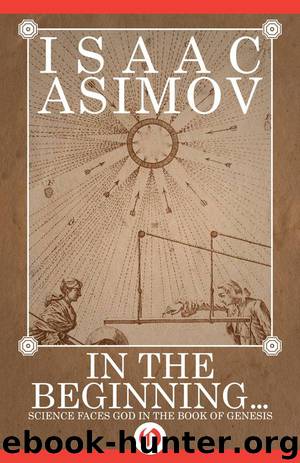In the Beginning: Science Faces God in the Book of Genesis by Isaac Asimov

Author:Isaac Asimov [Asimov, Isaac]
Language: eng
Format: epub
Publisher: Open Road Media
Published: 2014-06-10T00:00:00+00:00
Chapter 4
1 And Adam knew 136 Eve his wife; and she conceived, and bare Cain, 137 and said, I have gotten a man from the Lord.138
136. his is a Biblical euphemism for sexual relations. The Bible is full of euphemisms. The use of “Lord” in place of “Yahveh” is a euphemism, for that matter.
137. The name Cain (Kayin in Hebrew) means “smith.” In the early days of civilization, the use of metals was introduced, and the new materials became exceedingly important both in ornamentation and in the manufacture of tools and of weapons for hunting and warfare. Men who could prepare the metals and work them into the necessary shapes were important and highly regarded artisans. To be a smith and to be called one was a matter of pride and honor, and to this day Smith is a common surname among English-speaking peoples.
138. To explain the name, the Biblical writers sought for some similar-sounding Hebrew word and found it in kanah, meaning “to get.”
2 And she again bare his brother Abel. 139And Abel was a keeper of sheep, 140 but Cain was a tiller of the ground.141
139. No derivation is given for the name Abel (Hebel or Hevel in Hebrew). The Hebrew word means “nothingness,” and this is taken usually to represent the briefness of Abel’s life. The actual derivation, however, may be aplu, which is an Akkadian word for “son.”
140. Since human beings were as yet allowed to eat only vegetable life, one might wonder why Abel kept sheep. Presumably, only for the production of wool and the fashioning of garments therefrom. If so, this is not likely to match actual history. As far as we know, the first herdsmen used their animals as a food supply in addition to any other uses involved.
141. Farming and herding grew up together in the early days of civilization, but since plants can be grown more thickly than animals, end since more calories per acre can be produced in the form of cultivated grain than in the form of domesticated animals, farming communities were more thickly populated than herding communities.
The larger population of agricultural societies offered more opportunity for specialization and for technological advance, so that the use of metals (as well as of other luxuries) was more associated with the settled and populous farming communities than with the roaming, sparsely peopled herding tribes. It is rather appropriate, therefore, that the farmer should be named Cain (“smith”).
3 And in process of time it came to pass, that Cain brought of the fruit of the ground an offering unto the Lord.142
142. This is the first example of a sacrificial rite in the Bible. The word “sacrifice” is from the Latin, meaning “to make sacred,” that is, to set aside something for the use of a god. Because one deprives one’s self in order to set aside something for the gods, “sacrifice” has gained its present meaning.
Originally, the motivation that led to the sacrifice may well have been analogous to that which leads to the bringing of a gift to a king.
Download
This site does not store any files on its server. We only index and link to content provided by other sites. Please contact the content providers to delete copyright contents if any and email us, we'll remove relevant links or contents immediately.
The Lost Art of Listening by Michael P. Nichols(7488)
Why I Am Not A Calvinist by Dr. Peter S. Ruckman(4148)
The Rosicrucians by Christopher McIntosh(3509)
Wicca: a guide for the solitary practitioner by Scott Cunningham(3166)
Signature in the Cell: DNA and the Evidence for Intelligent Design by Stephen C. Meyer(3125)
Real Sex by Lauren F. Winner(3013)
The Holy Spirit by Billy Graham(2943)
To Light a Sacred Flame by Silver RavenWolf(2814)
The End of Faith by Sam Harris(2733)
The Gnostic Gospels by Pagels Elaine(2527)
Waking Up by Sam Harris(2454)
Nine Parts of Desire by Geraldine Brooks(2358)
Jesus by Paul Johnson(2352)
Devil, The by Almond Philip C(2324)
The God delusion by Richard Dawkins(2305)
Heavens on Earth by Michael Shermer(2278)
Kundalini by Gopi Krishna(2180)
Chosen by God by R. C. Sproul(2160)
The Nature of Consciousness by Rupert Spira(2096)
